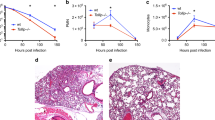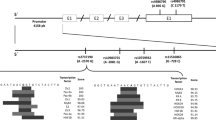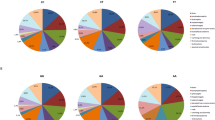Abstract
Coxiella burnetii is a macrophage-tropic, Gram-negative organism, which causes acute Q fever infection in humans. This zoonotic infection causes illness ranging from asymptomatic seroconversion to severe and protracted disease featuring hepatitis and pneumonia. Interactions between C. burnetii lipopolysaccharide (LPS) and host Toll-like receptors (TLR)-2 and -4 have been implicated in pathogen recognition, phagocytosis and signaling responses. Nonconservative single nucleotide polymorphisms in the coding regions of TLR-2 (Arg677Trp and Arg753Gln) and TLR-4 (Asp299Gly) have been found to correlate with mycobacterial infections and Gram-negative sepsis respectively. Associations between the TLR-2 and -4 polymorphisms, illness characteristics and immune response parameters were examined in subjects with acute Q fever (n=85) and comparison subjects with viral infections (n=162). No correlation was demonstrated between these polymorphisms and susceptibility to Q fever, illness severity or illness course.
This is a preview of subscription content, access via your institution
Access options
Subscribe to this journal
Receive 6 digital issues and online access to articles
$119.00 per year
only $19.83 per issue
Buy this article
- Purchase on Springer Link
- Instant access to full article PDF
Prices may be subject to local taxes which are calculated during checkout


Similar content being viewed by others
References
Maurin M, Raoult D . Q fever. Clin Microbiol Rev 1999; 12: 518–553.
Hickie I, Davenport T, Wakefield D, Vollmer-Conna U, Cameron B, Vernon SD et al. Post-infective and chronic fatigue syndromes precipitated by viral and non-viral pathogens: prospective cohort study. BMJ 2006; 333: 575–578.
Underhill DM, Ozinsky A, Hajjar AM, Stevens A, Wilson CB, Bassetti M et al. The Toll-like receptor 2 is recruited to macrophage phagosomes and discriminates between pathogens. Nature 1999; 401: 811–815.
Qureshi ST, Lariviere L, Leveque G, Clermont S, Moore KJ, Gros P et al. Endotoxin-tolerant mice have mutations in Toll-like receptor 4 (Tlr4). J Exp Med 1999; 189: 615–625.
Honstettre A, Ghigo E, Moynault A, Capo C, Toman R, Akira S et al. Lipopolysaccharide from Coxiella burnetii is involved in bacterial phagocytosis, filamentous actin reorganisation, and inflammatory responses through Toll-like receptor 4. J Immunol 2004; 172: 3695–3703.
Zamboni DS, Campos MA, Torrecihas ACT, Kiss K, Samuel JE, Golenbock DT et al. Stimulation of Toll-like receptor 2 by Coxiella burnetii is required for macrophage production of pro-inflammatory cytokines and resistance to infection. J Biol Chem 2004; 279: 54405–54415.
Ben-Ali M, Barbouche M-R, Bousnina S, Chabbou A, Dellagi K . Toll-like receptor 2 (Arg677Trp) polymorphism is associated with susceptibility to tuberculosis in Tunisian patients. Clin Diagn Lab Immunol 2004; 11: 625–626.
Kang TJ, Chae G-T . Detection of Toll-like receptor 2 (TLR2) mutation in the lepromatous leprosy patients. FEMS Immunol Med Microbiol 2001; 31: 53–58.
Lorenz E, Mira JP, Frees KL, Schwartz DA . Relevance of mutations in the TLR4 receptor in patients with Gram-negative septic shock. Arch Intern Med 2002; 162: 1028–1032.
Owen R, Roche PW, Hope K, Yohannes K, Roberts A, Liu C et al. Australia's notifiable diseases status, 2005: annual report of the National Notifiable Diseases Surveillance System. Commun Dis Intell 2007; 31: 1–70.
Lorenz E, Frees K, Schwartz DA . Determination of the TLR4 genotype using allele-specific PCR. Biotechniques 2001; 31: 22–24.
Sánchez E, Orozco G, López-Nevot MÁ, Jiménez-Alonso J, Martin J . Polymorphisms of Toll-like receptor 2 and 4 genes in rheumatoid arthritis and systemic lupus erythematosus. Tissue Antigens 2004; 63: 54–57.
The International HapMap Consortium. The International Hapmap Project. Nature 2003; 426: 789–796.
Ogus AC, Yoldas B, Ozdemir T, Uguz A, Olcen S, Keser I et al. The Arg753Gln polymorphism of the human Toll-like receptor 2 gene in tuberculosis disease. Eur Respir J 2004; 23: 219–223.
Lorenz E, Mira JP, Frees KL, Schwartz DA . Relevance of mutations in the TLR4 receptor in patients with gram-negative septic shock. Arch Intern Med 2002; 162: 1028–1032.
Julious SA . Sample sizes for clinical trials with normal data. Stat Med 2004; 23: 1921–1986.
Vollmer-Conna U, Fazou C, Cameron B, Li H, Brennan C, Luck L et al. Production of pro-inflammatory cytokines correlates with the symptoms of acute sickness behaviour in humans. Psychol Med 2004; 34: 1289–1297.
Lorenz E, Mira JP, Cornish KL, Arbour NC, Schwartz DA . A novel polymorphism in the Toll-like receptor 2 gene and its potential association with staphylococcal infection. Infect Immun 2000; 68: 6398–6401.
von Aulock S, Schröder NWJ, Traub S, Gueinzius K, Lorenz E, Hartung T et al. Heterozygous Toll-like receptor 2 polymorphism does not affect lipoteichoic acid-induced chemokine and inflammatory responses. Infect Immun 2004; 72: 1828–1831.
Arbour NC, Lorenz E, Schutte BC, Zabner J, Kline JN, Jones M et al. TLR4 mutations are associated with endotoxin hyporesponsiveness in humans. Nat Genet 2000; 25: 187–191.
Imahara SD, Jelacic S, Junker CE, O’Keefe GE . The TLR4 +896 polymorphism is not associated with lipopolysaccharide hypo-responsiveness in leukocytes. Genes Immun 2005; 6: 37–43.
Kinane DF, Shiba H, Stathopoulou PG, Zhao H, Lappin DF, Singh A et al. Gingival epithelial cells heterozygous for Toll-like receptor 4 polymorphisms Asp299Gly and Thr399Ile are hypo-responsive to Porphyromonas gingivalis. Genes Immun 2006; 7: 190–200.
Schnare M, Barton GM, Holt AC, Takeda K, Akira S, Medzhitov R . Toll-like receptors control activation of adaptive immune responses. Nat Immunol 2001; 2: 947–950.
Acknowledgements
This study was supported by grants from the National Health and Medical Research Council of Australia Project Grants (No.s 157092 and 157062), Meat & Livestock, Australia and by a Cooperative Research Agreement with the Centers for Disease Control and Prevention, USA (No. U50/CCU019851–01).
Author information
Authors and Affiliations
Corresponding author
Additional information
Conflict of Interest
The authors state that they have no commercial or other association which would pose a conflict of interest in this work.
Rights and permissions
About this article
Cite this article
Everett, B., Cameron, B., Li, H. et al. Polymorphisms in Toll-like receptors-2 and -4 are not associated with disease manifestations in acute Q fever. Genes Immun 8, 699–702 (2007). https://doi.org/10.1038/sj.gene.6364428
Received:
Revised:
Accepted:
Published:
Issue Date:
DOI: https://doi.org/10.1038/sj.gene.6364428



